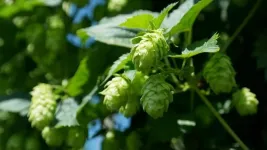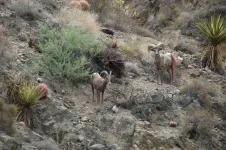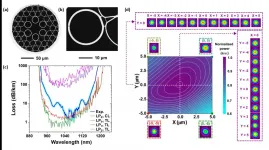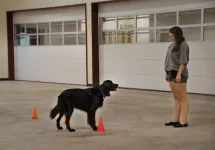CovMT: Tracking virus mutations across the world
2021-02-22
(Press-News.org) A SARS-CoV-2 tracker uses publicly available sequencing data to show how the virus is changing and spreading over time. The tracker, called CovMT, was developed at KAUST and is expected to help researchers and policymakers understand the evolution of the virus's mutations. This could have implications for vaccine development, patient treatment and the implementation of restrictions.
"As new variants of the SARS-CoV-2 virus emerge, authorities around the world need to know if these, or similar variants, have entered their countries," says computational biologist, Intikhab Alam, who designed the CovMT system with a team in KAUST's Computational Bioscience Research Center. "The World Health Organization is stressing to all countries to ramp up their sequencing efforts. With this increase in sequencing, we expect CovMT will help researchers, the public and policymakers to explore up-to-date country-specific information on sequencing efforts, evolving virus variants and disease severity."
Each day, publicly available data is downloaded to CovMT from GISAID, an initiative that collates genetic sequences and the related clinical and epidemiological data about the SARS-CoV-2 virus from various parts of the world. The CovMT platform processes this data to detect mutations and mutation fingerprints and define clades.
CovMT then provides interactive graphics to help visualize the results in a user-friendly form.
For example, the tracker shows which SARS-CoV-2 clades are present in which continents. It also shows the countries that are providing SARS-CoV-2 sequencing data and the local and foreign mutational fingerprints of the virus present in each country.
The team devised the concept of "mutational fingerprints" to describe virus isolates that have the same set of virus mutations. This helps scientists to see where a virus with a mutational fingerprint was first detected and then to which countries it eventually spread. Since GISAID includes some patient data that correlates virus variants and mutations with disease severity, the tracker can also predict the disease severity of virus isolates that have similar mutational fingerprints but lack patient data.
The tracker shows that the B.1.1.7 variant, which acquired a specific mutation in its spike protein called N501Y to lead to a rapid rise of infections in the UK in the autumn and winter months of 2020, has also acquired the E484K mutation. This could have implications for vaccine effectiveness against this variant.
Also, the tracker shows that 510 virus isolates of the B.1.351 variant have three mutations in the receptor binding region of the spike protein. This region is of particular significance because mutations in it could make the virus more infectious. This triple RBD mutation variant is now found in South Africa, the UK and 22 other countries.
"CovMT can be adapted for other infectious diseases like MERS-CoV and the influenza virus in the future," says molecular biologist, Takashi Gojobori, the acting director of KAUST's Computational Bioscience Research Center. He formed the task force that developed CovMT.
"We are also making a Saudi-specific version of the tracker for the Saudi Center for Disease Prevention and Control. To monitor variants of concern in the kingdom, we will need to increase our national sequencing effort," Gojobori explains. "A COVID-19 consortium in Saudi Arabia could be our best option to achieve this."
INFORMATION:
CovMT is publicly available at https://www.cbrc.kaust.edu.sa/covmt/index.php?p=home
ELSE PRESS RELEASES FROM THIS DATE:
2021-02-22
Treating waste brine using a self-cleaning crystallizer that runs on solar power could be an eco-friendly and efficient way to make seawater desalination more sustainable.
In desert regions, seawater desalination provides essential freshwater for drinking and agriculture. A major problem is that the process generates vast quantities of concentrated brine that is often released into nearby lakes and rivers or back into the sea, harming vegetation and marine life. "With tightening environmental regulations and increasing public awareness, there is pressure to treat brine with zero liquid discharge," says Chenlin Zhang, a Ph.D. student in KAUST. This means extracting every last drop of water while leaving behind solid mineral crystals that can be salvaged for other uses.
Crystallization ...
2021-02-22
Monoclonal antibodies are part of the therapeutic arsenal for eliminating cancer cells. Some make use of the immune system to act and belong to a class of treatment called "immunotherapies." But how do these antibodies function within the tumor? And how can we hope to improve their efficacy? Using innovative in vivo imaging approaches, scientists from the Institut Pasteur and Inserm visualized in real time how anti-CD20 antibodies, used to treat B-cell lymphoma, guide the immune system to attack tumor cells. Their findings were published in the journal Science Advances on February 19, 2021
Anti-CD20 antibodies are used in clinical practice to treat patients with B-cell lymphoma, a type of blood cancer. The treatment, often used in combination with chemotherapy, has been ...
2021-02-22
A mixture of smaller countries led by New Zealand, Vietnam, Taiwan, Thailand, Cyprus, Rwanda and Iceland led the world 's Top 10 countries to manage their COVID-19 response well, according to a new study.
In the study, published in The BMJ, lead researcher Flinders University's Professor Fran Baum joined experts from around the world to reflect upon the Global Health Security Index (October 2019) predictions for a public health emergency.
Along with Australia, Latvia and Sri Lanka among the best responders, the list highlights some of the 10 key causes of why some countries were successful or not in containing COVID-19 pandemic over the past year.
The US, UK, Netherlands, Australia, Canada, Thailand, Sweden, Denmark, South Korea, Finland (France, Slovenia and Switzerland) ...
2021-02-22
People with periodontitis are at higher risk of experiencing major cardiovascular events, according to new research from Forsyth Institute and Harvard University scientists and colleagues.
In a longitudinal study published recently in the Journal of Periodontology, Dr. Thomas
Van Dyke, Senior Member of Staff at Forsyth, Dr. Ahmed Tawakol of Massachusetts General Hospital, and their collaborators showed that inflammation associated with active gum disease was predictive of arterial inflammation, which can cause heart attacks, strokes, and other dangerous manifestations of cardiovascular disease.
For ...
2021-02-22
Despite deaths and hospitalisations linked to many new psychoactive substances (NPS), an international wastewater study led by the University of South Australia shows just how prevalent 'party pills' and 'bath salts' are in different parts of the world.
In a new paper published in Water Research, the world's most comprehensive wastewater analysis of NPS shows the pattern of designer drug use in the 2019/2020 New Year in 14 sites across Australia, New Zealand, China, The Netherlands, Spain, Italy, Norway and the United States.
UniSA analytical chemist Dr Richard Bade says samples were collected over the New Year in each country and ...
2021-02-22
CORVALLIS, Ore. - Oregon State University and U.S. Department of Agriculture researchers have significantly expanded the understanding of the hop genome, a development with important implications for the brewing industry and scientists who study the potential medical benefits of hops.
"This research has the unique ability to impact several different fields," said David Hendrix, an associate professor in the Department of Biochemistry and Biophysics and the School of Electrical Engineering and Computer Science at Oregon State. "If you're talking to beer drinkers, they will be excited about the brewing side. If you are talking to the medical field, they are going to be excited about the pharmaceutical potential."
The findings are outlined in ...
2021-02-22
CORVALLIS, Ore. - Scientists at Oregon State University and the U.S. Forest Service have demonstrated that DNA extracted from water samples from rivers across Oregon and Northern California can be used to estimate genetic diversity of Pacific salmon and trout.
The findings, just published in the journal Molecular Ecology, have important implications for conservation and management of these species, which are threatened by human activities, including those exacerbating climate change.
"There has been a dearth of this kind of data across the Northwest," said Kevin Weitemier, a postdoctoral fellow at Oregon State and lead author of the paper. "This allows us to get a quick snapshot of multiple populations and species all at once."
In addition to demonstrating ...
2021-02-22
CORVALLIS, Ore. - Desert bighorn sheep in the Mojave National Preserve in California and surrounding areas appear to be more resilient than previously thought to a respiratory disease that killed dozens of them and sickened many more in 2013, a new study has found.
Clint Epps, a wildlife biologist at Oregon State University, and several co-authors, found that exposure to one of the bacteria associated with the disease is more widespread among bighorn sheep populations in the Mojave, and that its presence dates further back, than scientists thought. But they also found that the overall number of infected bighorn has declined since 2013 in the populations surveyed.
Epps and his colleagues, including Nicholas Shirkey, an environmental scientist with ...
2021-02-22
Recent spotlights on IC-HCPCFs are due to the recently demonstrated outstanding ultralow-loss performances and their application capabilities. Nevertheless, while their attenuation achieves impressive figures, the challenge of accomplishing a low loss, single-mode (SM), and polarization-maintaining HCPCF perseveres.
In a new paper published in Light: Science & Applications, a team of scientists, led by Professor Fetah Benabid from the University of Limoges, France, and in collaboration of the University of Modena, Italy and the company GLOphotonics, proposed and ...
2021-02-22
CORVALLIS, Ore. - Dogs synchronize their behavior with the children in their family, but not as much as they do with adults, a new study from Oregon State University researchers found.
The findings are important because there is a growing body of evidence that dogs can help children in many ways, including with social development, increasing physical activity, managing anxiety or as a source of attachment in the face of changing family structures, the researchers said. Yet, very little research has focused on how dogs perceive and socially engage with children.
"The great news is that ...
LAST 30 PRESS RELEASES:
[Press-News.org] CovMT: Tracking virus mutations across the world







